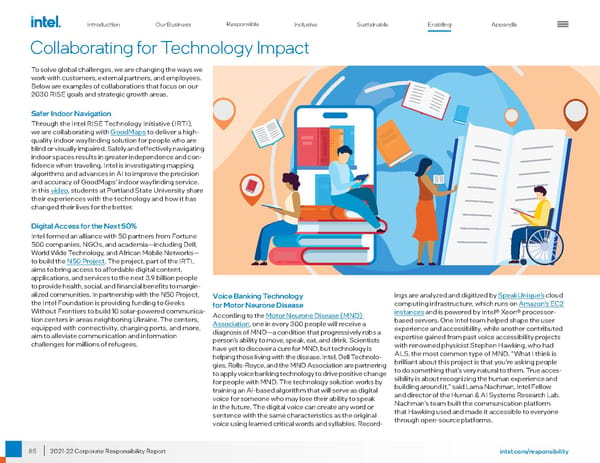85 intel.com/responsibility 2021-22 Corporate Responsibility Report Collaborating for Technology Impact To solve global challenges, we are changing the ways we work with customers, external partners, and employees. Below are examples of collaborations that focus on our 2030 RISE goals and strategic growth areas. Safer Indoor Navigation Through the Intel RISE Technology Initiative (IRTI), we are collaborating with GoodMaps to deliver a high- quality indoor wayfinding solution for people who are blind or visually impaired. Safely and effectively navigating indoor spaces results in greater independence and con - fidence when traveling. Intel is investigating mapping algorithms and advances in AI to improve the precision and accuracy of GoodMaps’ indoor wayfinding service. In this video , students at Portland State University share their experiences with the technology and how it has changed their lives for the better. Digital Access for the Next 50% Intel formed an alliance with 50 partners from Fortune 500 companies, NGOs, and academia—including Dell, World Wide Technology, and African Mobile Networks— to build the N50 Project . The project, part of the IRTI, aims to bring access to affordable digital content, applications, and services to the next 3.9 billion people to provide health, social, and financial benefits to margin - alized communities. In partnership with the N50 Project, the Intel Foundation is providing funding to Geeks Without Frontiers to build 10 solar-powered communica - tion centers in areas neighboring Ukraine. The centers, equipped with connectivity, charging ports, and more, aim to alleviate communication and information challenges for millions of refugees. Voice Banking Technology for Motor Neurone Disease According to the Motor Neurone Disease (MND) Association , one in every 300 people will receive a diagnosis of MND—a condition that progressively robs a person’s ability to move, speak, eat, and drink. Scientists have yet to discover a cure for MND, but technology is helping those living with the disease. Intel, Dell Technolo - gies, Rolls-Royce, and the MND Association are partnering to apply voice banking technology to drive positive change for people with MND. The technology solution works by training an AI-based algorithm that will serve as digital voice for someone who may lose their ability to speak in the future. The digital voice can create any word or sentence with the same characteristics as the original voice using learned critical words and syllables. Record - ings are analyzed and digitized by SpeakUnique’s cloud computing infrastructure, which runs on Amazon’s EC2 instances and is powered by Intel® Xeon® processor- based servers. One Intel team helped shape the user experience and accessibility, while another contributed expertise gained from past voice accessibility projects with renowned physicist Stephen Hawking, who had ALS, the most common type of MND. “What I think is brilliant about this project is that you're asking people to do something that’s very natural to them. True acces - sibility is about recognizing the human experience and building around it,” said Lama Nachman, Intel Fellow and director of the Human & AI Systems Research Lab. Nachman’s team built the communication platform that Hawking used and made it accessible to everyone through open-source platforms. Introduction Our Business Responsible Inclusive Sustainable Appendix Enabling
 Intel Corporate Responsibility Report Page 84 Page 86
Intel Corporate Responsibility Report Page 84 Page 86